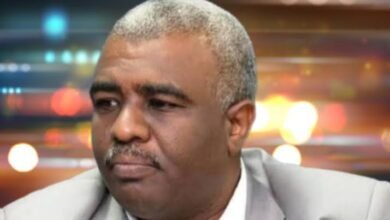Inauguration of the GERD: Water Security and Regional Balance

Ibrahim Shaqlawi
I had the opportunity to review the original copy of the official agreement between Sudan and Ethiopia on the exchange of information regarding the filling and operation of the Grand Ethiopian Renaissance Dam (GERD). Drawing on this document, this article explores the prospects for strengthening Sudan’s water security and possible regional balances, in light of Sudan’s strategic relations with Egypt and its growing rapprochement with Ethiopia.
The inauguration of the GERD on Tuesday, 9 December 2025, marked a pivotal moment in reshaping the water and political equation in the Nile Basin. After more than a decade of debate, negotiations, and escalations, the dam entered into full operation, bringing with it a complex mix of opportunities and fears—particularly for Sudan, which directly neighbours the dam; for Egypt, which depends on the Nile as an almost sole source of water; and for Ethiopia, which regards the project as a symbol of sovereignty and developmental ambition.
Sudan, as the country most technically and operationally affected by the GERD, adopted a different strategic path from Egypt when it chose to sign a bilateral agreement with Ethiopia in October 2022 to regulate the exchange of technical and operational information relating to the dam.
The agreement—revealed publicly only after the Sudanese Minister of Irrigation and the head of the Nile Water Technical Authority visited Cairo recently—contains clear Ethiopian commitments to release specified volumes of water (no less than 300 cubic metres per second), to adopt a phased filling process during the rainy season, and to reduce storage in times of drought.
More importantly, the agreement regulates the daily exchange of information between the two sides, covering water levels, flows, releases, and water quality, and establishes a joint technical mechanism for coordination and decision-making by consensus. From a technical perspective, this framework is essential for ensuring the safety of Sudan’s nearby dams, such as Roseires, mitigating risks linked to floods or sudden water shortages, and enhancing Sudan’s prospects for improved agriculture, electricity generation, and domestic resource development.
At the political level, however, the agreement has raised questions over whether Sudan has compromised its historic solidarity with Egypt, or whether it has taken a calculated step to safeguard its immediate national interests.
The reality is that Sudan’s sensitive geographical position, combined with its prior experiences of Ethiopia’s unilateral filings, compelled it to move towards bilateral technical understandings. Daily coordination with Ethiopia is not a diplomatic manoeuvre but an operational engineering necessity to secure the safety of more than 20 million Sudanese along the Blue Nile.
By contrast, Egypt sees any bilateral arrangement with Ethiopia, absent a comprehensive agreement, as a threat to historic water-sharing arrangements and a validation of Ethiopia’s unilateral approach. Consequently, Cairo recently submitted an official memorandum to the UN Security Council, affirming its readiness to take “all necessary measures” to defend its water rights. Between these two positions lies the real challenge: constructing a joint regional framework that can restore lost trust and establish cooperative rules that leave no party excluded.
Sudan’s experience during the dam’s fourth filling in 2023—coinciding with relative drought despite abundant rainfall in some states—demonstrated that the situation could be managed reasonably well, thanks to information exchange and technical coordination, even in a fragile water context.
Hydrological data published earlier by Sudan’s Ministry of Water Resources and Irrigation indicated that Blue Nile flows during the flood season preceding the agreement were the lowest in decades—even lower than those of 1948, a historical reference point for drought. That crisis forced some Nile water stations out of service, reduced agricultural acreage, and cut electricity production.
In this context, the agreement with Ethiopia—though not comprehensive—emerges as Sudan’s first line of defence to protect its water security. It is also a test of Sudan’s ability to negotiate and expand this framework towards eventual joint management of the dam, ensuring full coordination during emergencies such as generation failures, water quality changes, sudden flooding, or prolonged drought.
Meanwhile, Ethiopia’s repeated assertions that the GERD is a “regional project” may open the door to broader understandings with Egypt, particularly if built on the technical and environmental provisions of the Sudan–Ethiopia agreement. These include precise commitments to update safety measures, share daily data, and establish a joint technical mechanism capable of resolving potential disputes.
Ultimately, the GERD cannot be viewed merely as an engineering structure for electricity generation; it is a tool for redefining relations among Nile Basin states. Just as Sudan’s geography imposes exceptional sensitivity towards the dam, Egypt’s historical and legal considerations underpin its more cautious stance. Yet what unites the three states outweighs what divides them—their shared dependence on a single river.
The real choice facing all is not between confrontation or concession, but between stagnation and progress towards genuine cooperation that can transform the dam from a point of contention into a platform for partnership. The Sudan–Ethiopia bilateral agreement, despite its limitations, could serve as the nucleus for a broader settlement if approached from a strategic perspective rather than as a tactical bargain.
From the perspective of #Face_of_Truth, in a world of mounting environmental and geopolitical challenges, the GERD stands as a symbol of intersecting interests and ambitions. Success in managing this monumental project lies not only in its engineering but in the ability of the parties to build trust, foster understanding, and embrace a spirit of cooperation that transcends borders and narrow politics. Water security and regional balance in the Nile Basin will ultimately depend on the wisdom and boldness of its leaders to transform crises into opportunities, and to deliver the peace and development long awaited by the peoples of the region.
Shortlink: https://sudanhorizon.com/?p=7541

